If your CV keeps getting rejected, this can quickly become disheartening.
But if you know why it’s being rejected, you can improve it and start landing job interviews.
Here are eight common reasons why your CV might be getting ignored… And how to fix them.
Your CV is not tailored to your target jobs
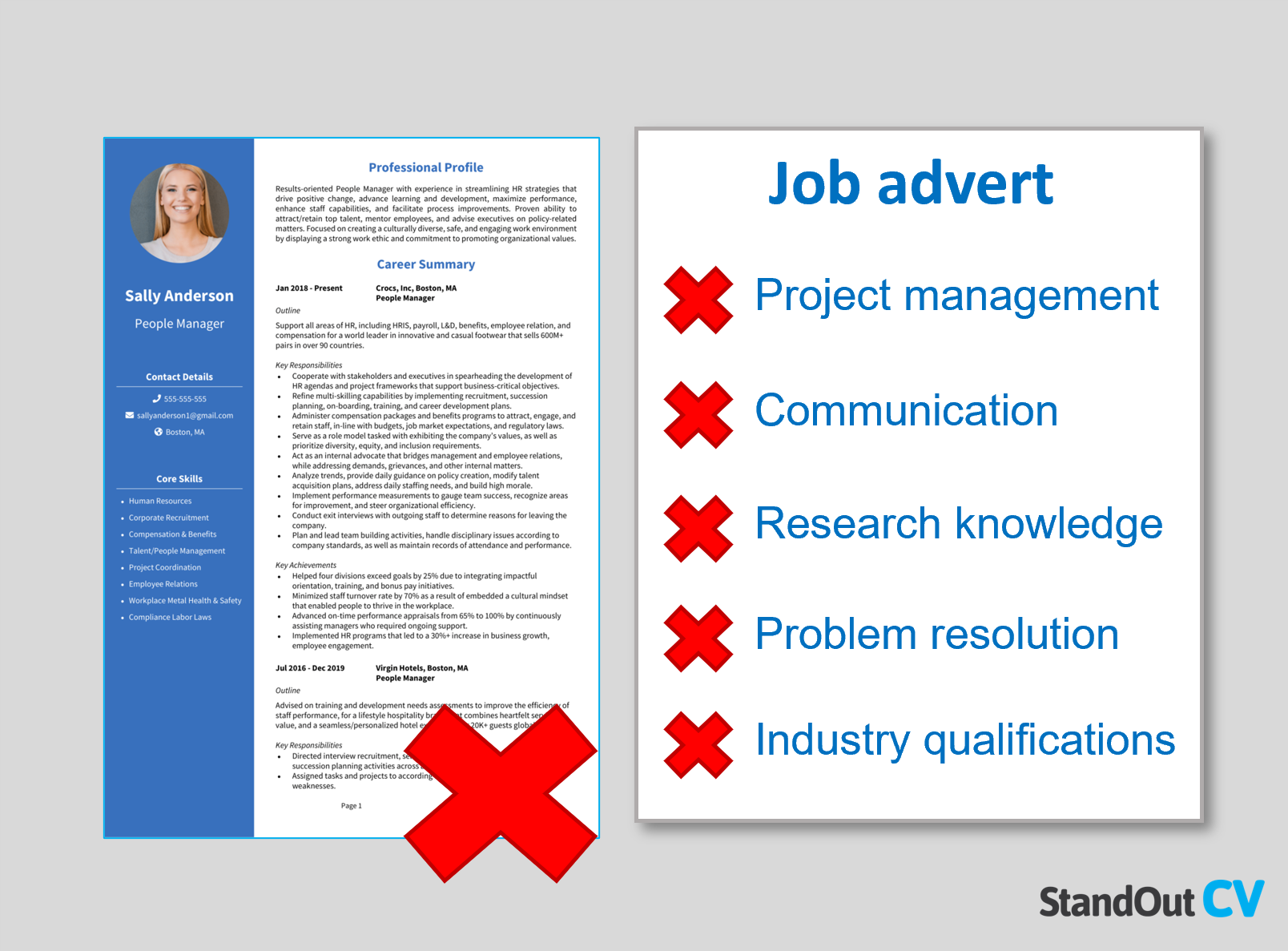
You might have spent a lot of time writing your CV, but if you don’t tailor it to your target jobs, then you’re still likely being ignored.
Recruiters only want to see information which is relevant to the jobs they are recruiting for.
If they can’t quickly find that key information, they will probably skip straight past your CV.
Tailoring your application is the best way to combat this.
How to fix this
The good news is, there are several simple ways you can tailor your CV to increase your chances of being invited in for an interview:
- Read the job description – The job description is going to be a key tool here. You need to read it through and highlight any keywords or skills that the employer has outlined as being important to the job
- Include the relevant keywords – Once you know what the employer is looking for, you can pepper the keywords and skills relevant to you throughout your CV.
- Cut out the irrelevant info – You may have a huge range of skills, but some of them might not be relevant to the jobs you are applying for, so cut out anything that will not be important to this particular job.
- Be intentional – Don’t just include information to fill the space; always be intentional about the details you provide and ensure these relate to the specific job or company in some way
Your CV is hard to read
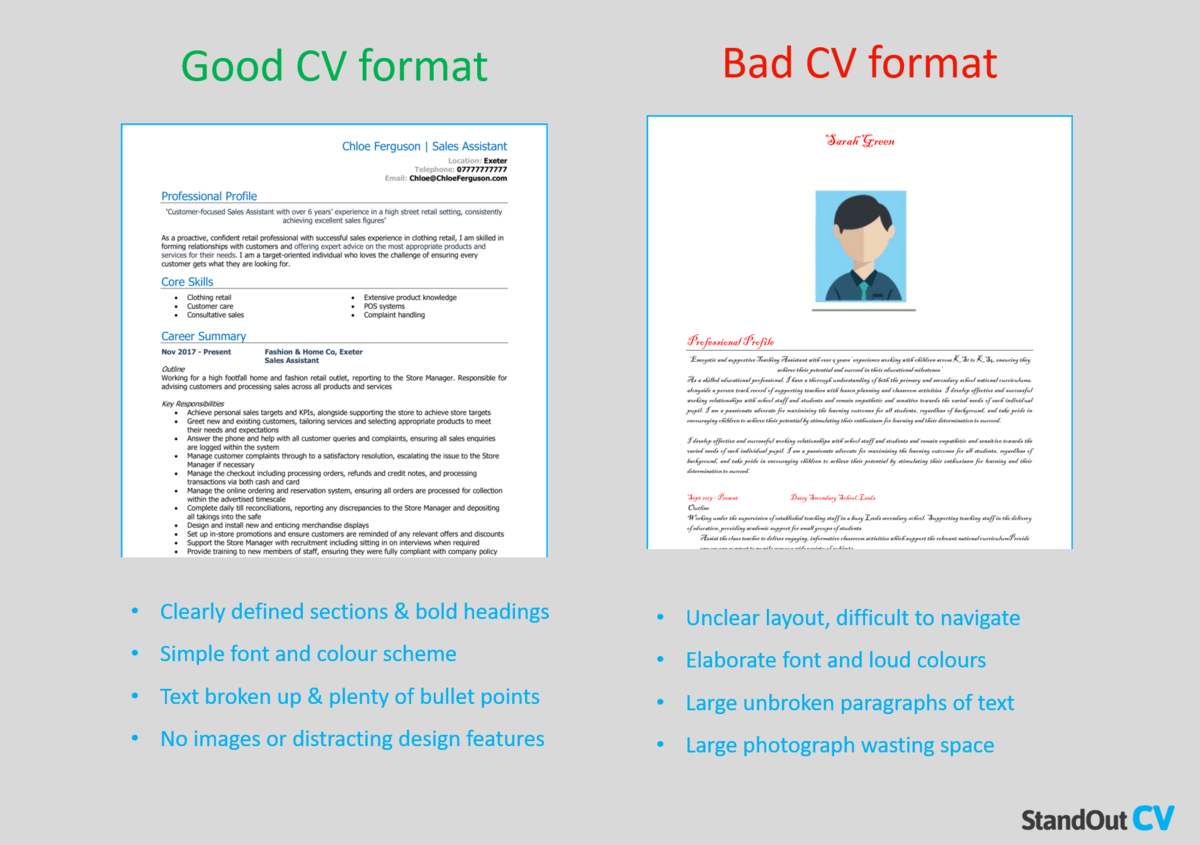
How you format your CV can make or break your application.
If it’s poorly formatted, it becomes difficult to read.
If this is the case, most recruiters won’t be able to find the relevant information in your CV, and will just drop it on the rejection pile.
How to fix this
A well formatted CV is easy to read and allows the important facts to stand out.
Here are a few simple tips for making your CV a dream to read.
- Use headings – Bold headings and subheadings can help to break up the different sections, making it easier to navigate and digest the information.
- Add bullet points – Bullet points are another great way to structure information and highlight key points – especially when busy recruiters are skim-reading your CV.
- Choose a simple font – You need to make your text as easy to read as possible, so stick to clear fonts like Ariel or Times New Roman, and choose a font size between 10-12pt
- Keep it simple – When it comes to CV-design less is more. Don’t overwhelm readers with unnecessary logos, pictures or loud colour-schemes. Keep everything clean, simple and easy to read.


Your profile is not impressing recruiters
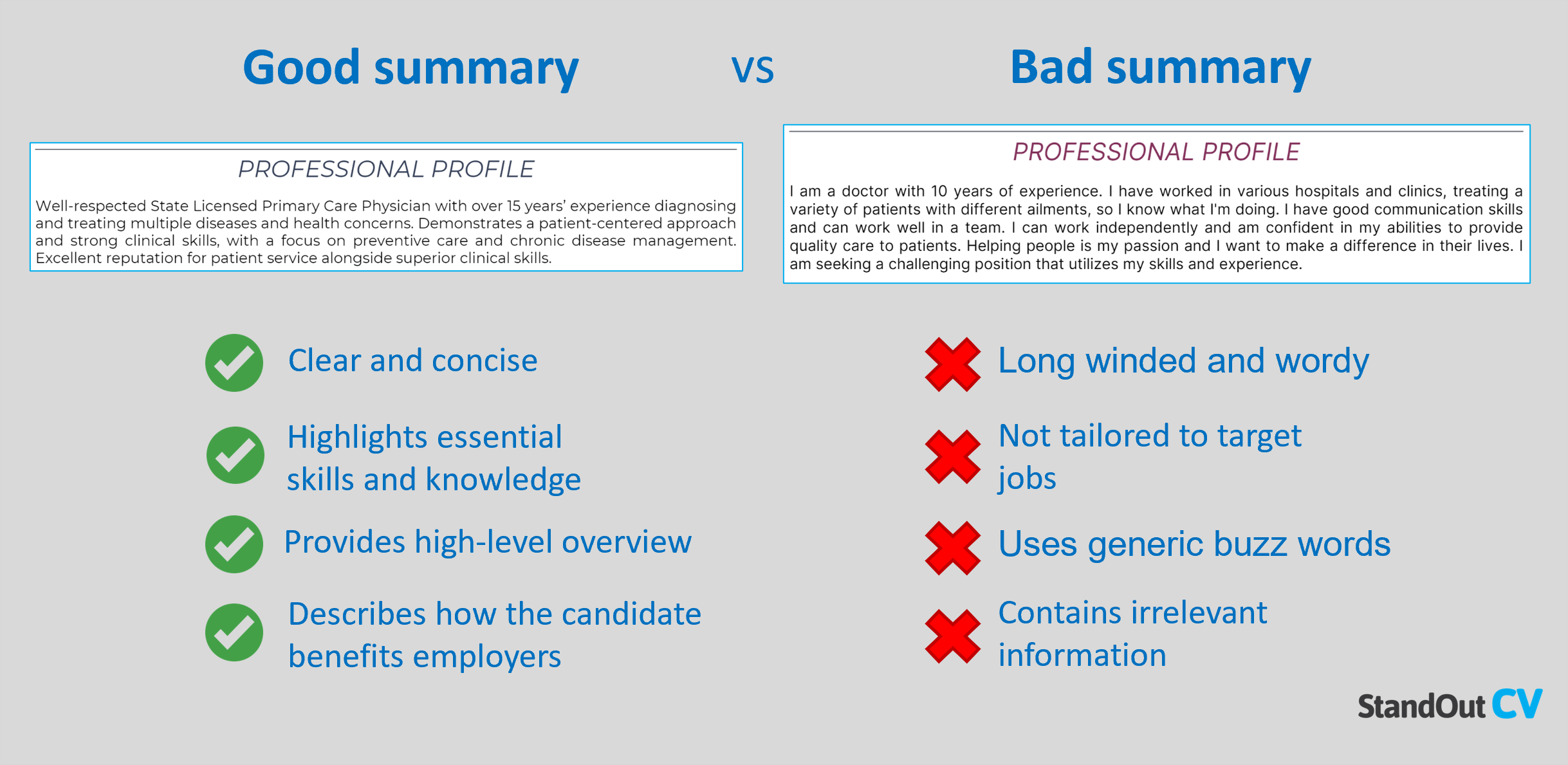
Your CV profile is your introduction to the recruiter, and it is the first section they will see on your CV.
So, if it doesn’t pack a punch, they might not continue reading the rest.
Your profile should instantly grab their attention and encourage them to keep reading.. If yours is not currently doing that, this could be a main cause of rejection.
How to fix this
To ensure that your CV profile is wowing hiring managers, try the following adjustments.
- Keep it brief – Your profile is designed to be a brief introduction, so keep the information high-level and save the details for your work experience section.
- Highlight your most impressive talents – Your CV needs to pack a punch, so lead with your impressive skills, achievements, experience, and qualifications.
- Match the job description – Read the job description to find out exactly what the employer wants and make sure your profile reflects the most important requirements.
- Describe the benefits you bring – Employers are only interested in what you can offer them, so tell them how you have benefited previous companies. E.g. have you saved them money or brought in new customers?
You did not include any achievements
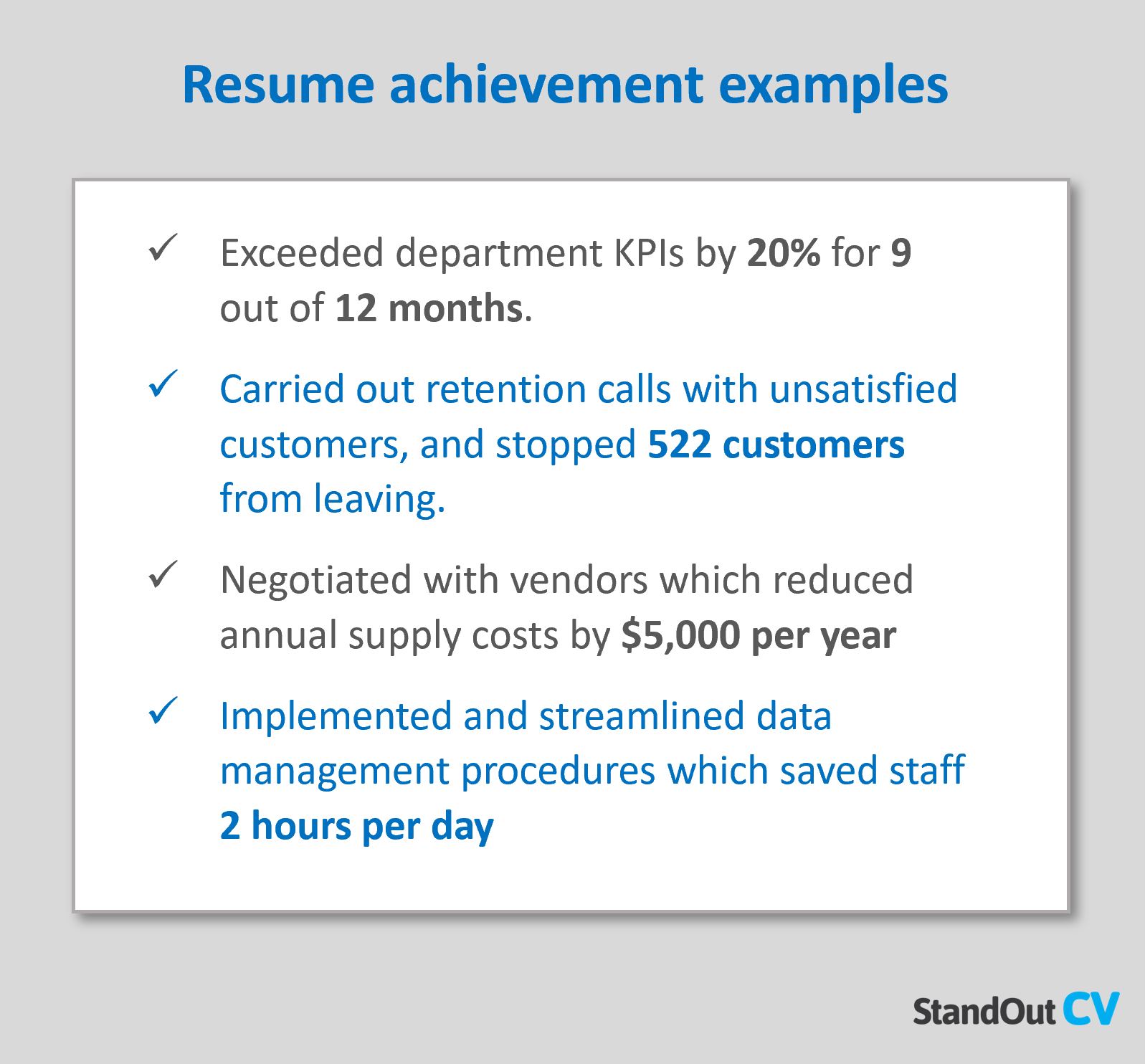
Your CV is your chance to shout about what makes you great.
Recruiters want to see what you’ve achieved so far in your career and how you can make a real difference. This can also help you to stand out from competitors.
Therefore, you would be remiss not to boast about your achievements on your CV and if you don’t this could actually cost you the job.
How to fix this
If you’re yet to give much context to your education and experience with your achievements, you need to fix this right away – here’s how:
- Return to the job description – Once again, return to the job description to see what skills and experience the employer wants, then think about how your previous achievements can match these
- List your achievements – Begin to write down your proudest achievements throughout your career and think about which ones make you most attractive to employers (anything that saves a company time or money is usually a great place to start)
- Provide facts and figures – You should quantify your achievements wherever possible to help potential employers understand the impact you have made. E,g, “Decreased customer waiting times by 30 minutes”
- Add to your jobs – You should include your achievements in the job where you achieved them, but you can also make brief mentions of any particularly impressive achievements in your CV profile.
Your CV is too long
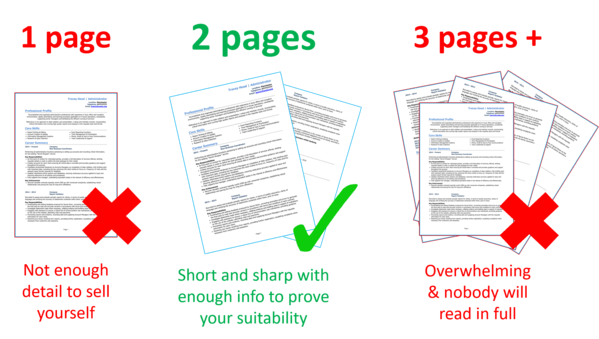
Your CV needs to be as clear and concise as possible, and if it’s too long, busy hiring mangers will not commit to reading it all.
Typically, a CV should be no more than one or two pages.
For junior candidates, one page is enough, but for those with more experience, two pages might be required to give sufficient details.
Either way, your CV should certainly never go over two pages, as this could cost you the opportunity.
How to fix this
If your CV is too long, there are some simple ways you can cut down on unnecessary information:
- Remove irrelevant information – You can pack your CV full of skills and achievements, but if they’re not relevant to the role, they need to go.
- Trim your work experience – Go back through and remove any outdated work experience. This should ideally not go back more than ten years.
- Think about your format – If your CV is only slightly too long, think about resizing the font to make it slightly smaller or decreasing your margins to fit more in. Just make sure it is still readable and looks good
- Remove references – If you’ve still got references on your CV, these can go. You don’t even really need to put ‘references available on request’. If the recruiter wants to speak with past employers, they’ll get in touch for details
Your CV is not structured correctly

Although there is a traditional structure you can follow when writing your CV, this can vary depending on what information is most important to the employer. Therefore, you need to put some careful thought into how you choose to structure your application.
If your CV is poorly structured, it becomes harder for the recruiter to find the details they’re looking for, which could ultimately lead them to put your CV on the rejection pile.
How to fix this
Getting the structure right can hugely improve your CV, and thankfully there are some helpful tips (and templates) you can use to do this:
- Order your CV sections the following way:
- Contact details
- Profile
- Work experience
- Education (move this up one spot if you have little/no experience)
- Additional information
- Make your contact details clear – You need to make sure your contact details are quick and easy to find, so no matter about the rest of the structure, make sure these are at the top of the page clearly.
- Use reverse chronological order – Whether it’s your educational background or work experience, your information should be organised in reverse chronologic order starting with the most recent first – because recruiters are more interested in recent info about you.
Your CV language is poor
Your CV needs to grip the reader in just a few short sentences and sum up your skills and experiences on just a page or two. Getting this right is no mean feat, but if you want your CV to be successful, it needs to be well-written.
If the recruiter spots spelling and grammatical errors, they’re unlikely to read any further. What’s more, if you’ve used boring or passive language, they can quickly become disengaged, and your CV will be facing the rejection pile.
How to fix this
You don’t need to be an expert writer to improve your CV; you just need to put in the time and effort to get this right. This is how to make your CV instantly more professional and engaging:
- Use power verbs – A great way to make your content more engaging and grab the recruiter’s attention is to use power verbs to highlight your skills
- Cut the fluff – If you notice big chunks of text that are a little boring, break these up with bullet points or subheadings and cut out boring basic skills and language. Instead, go for engagement and include only your highest-level and most interesting skills and accomplishments
- Proofread your CV – Before you submit your CV, proofread it multiple times to make sure there are no errors
- Have someone else read it – It’s best not to leave anything to chance, so have someone else read over your CV too. They’ll be able to spot mistakes and maybe even advise on ways you can improve the content
You did not write a cover letter
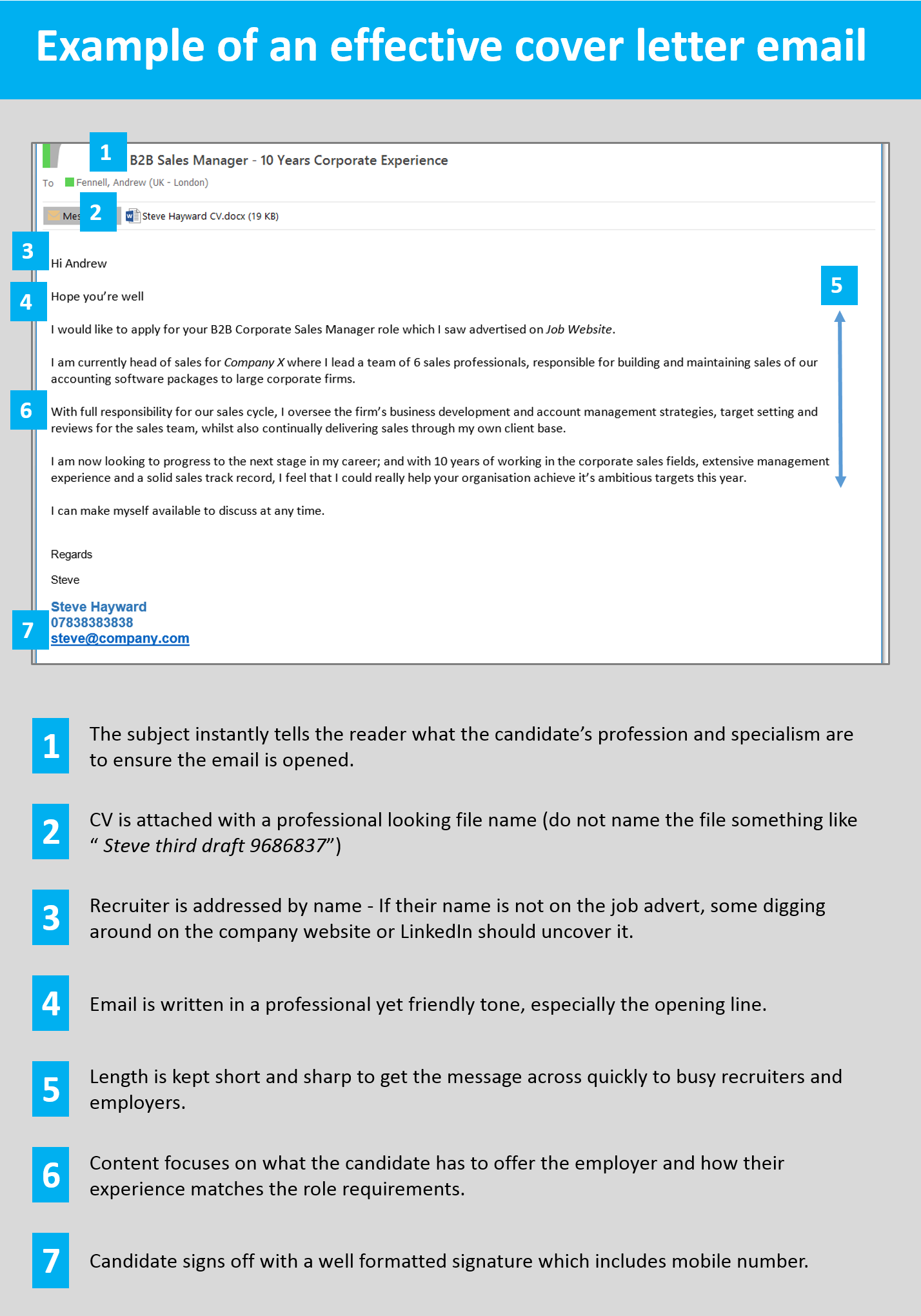
Cover letters can really help to boost your chances of being invited in for an interview. They give you a chance to share more details and showcase your motivation.
But only when you actually submit one.
If you have chosen not to submit a cover letter in the past, especially when asked for one, the recruiter might not have even seen any good reasons for reviewing your CV.
How to fix this
Never underestimate the impact a well-written cover letter can have on your job application; if you did not attach one last time, here’s how to rectify that:
- Greet the reader by name – Try your best to find the recruiter or hiring manager’s name and greet them with it to make an instant personal connection.
- Keep it brief – Your cover letter is intended to make an introduction and encourage the reader to open your CV, so it only needs to be a few sentences long.
- Summarise your key selling points – Explain the key three reasons why somebody should hire you if you want you cover letter to make an impact.
Unfortunately, there are multiple reasons your CV might end up on the rejection pile, and if you want to land a job, you need to address these right away.
The good news is, by taking your time and following all our tips above, you can spot these potential issues early on and fix the problem. That way, you can create a standout CV and cover letter that will boost your chances of securing an interview.


